 Wired vs. wireless smoke alarms – which is better
Wired vs. wireless smoke alarms – which is better
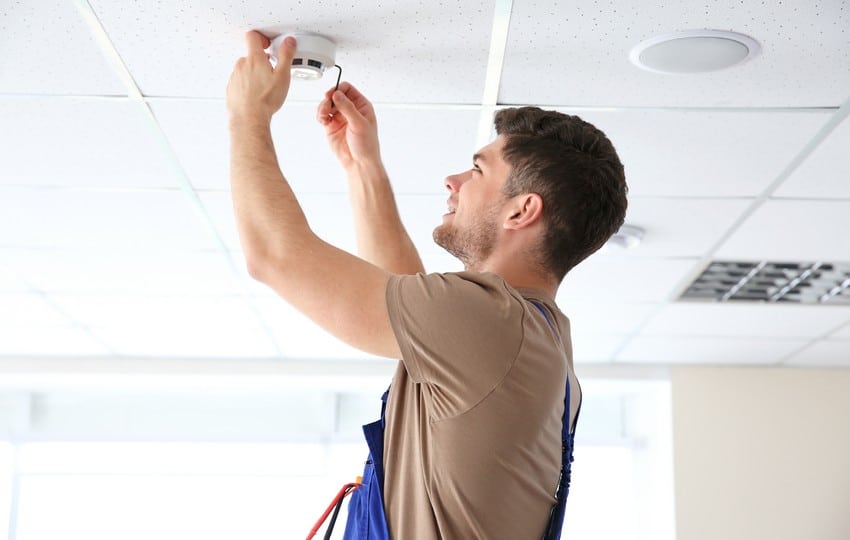
Evaluating Initial Investment for Smoke Alarms
When considering the installation of smoke alarms, property and business owners must weigh the initial investment of wired versus wireless systems. The upfront cost of hardwired smoke alarms is generally lower than their wireless counterparts. However, the total initial investment for wired systems may increase due to the complexity of installation, which often necessitates professional assistance and potential modifications to existing electrical infrastructure.
Factors Influencing Initial Cost Differences
- System Type: Wired alarms are typically less expensive per unit but may incur additional installation costs.
- Installation Requirements: Wireless systems offer simpler installation, potentially reducing initial labour costs.
- Smart Home Integration: Compatibility with smart home systems may affect the choice and cost of smoke alarms.
Hidden Costs in Smoke Alarm Installation
- Electrical Work: Hardwired systems may require electrical upgrades, adding to the overall cost.
- Wireless System Batteries: The need for battery replacements in wireless alarms should be factored into the cost.
Long-Term Financial Planning
- Maintenance: Consider the ongoing maintenance expenses, such as battery replacements for wireless systems.
- Insurance: Some insurers may offer discounts for certain types of smoke alarms, impacting long-term financial planning.
- Property Value: The choice of smoke alarm system can affect property value and should be considered in investment decisions.
By carefully evaluating these factors, you can make an informed decision that balances initial costs with long-term financial considerations.
Installation Complexity and Smart Home Integration
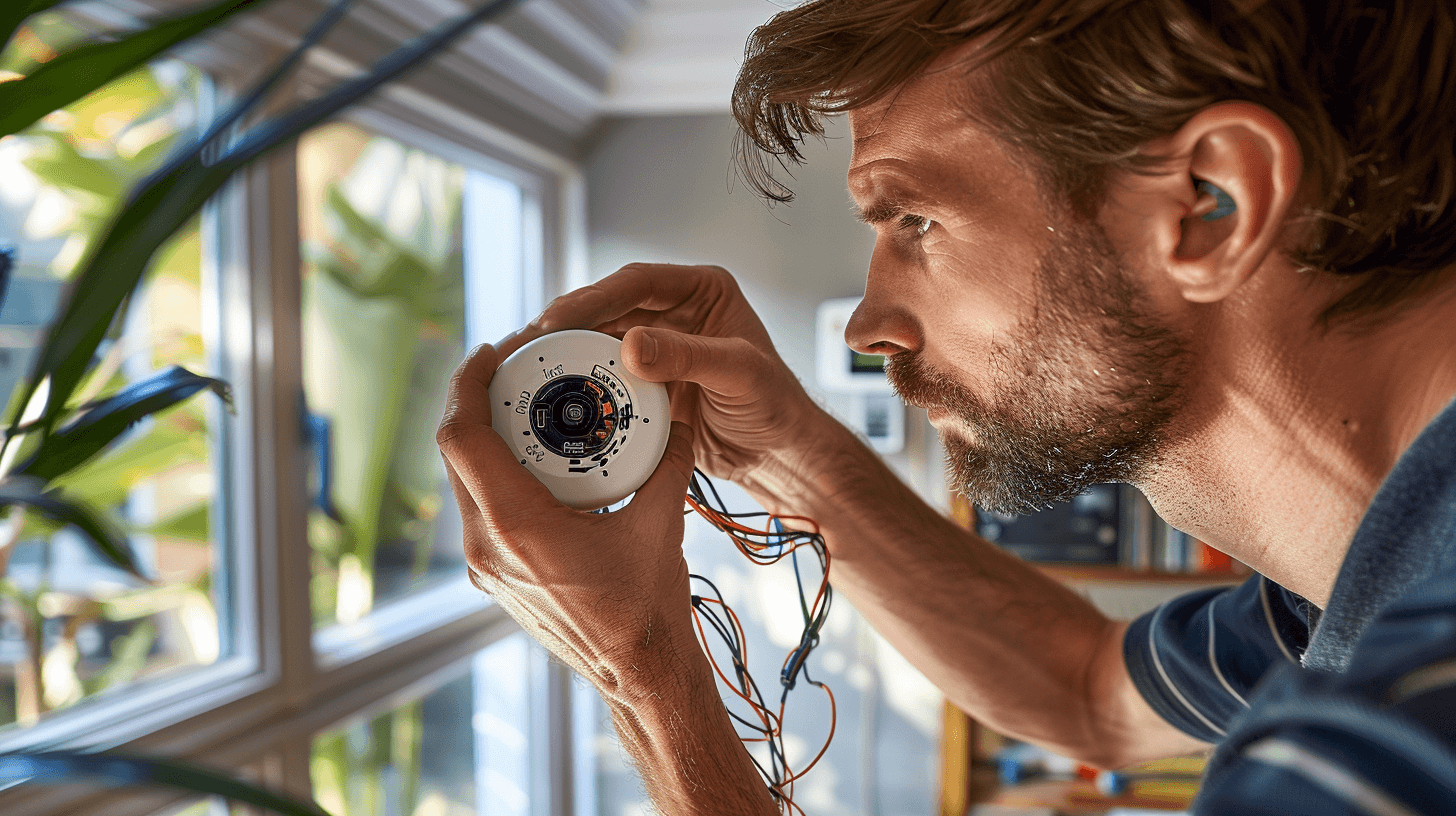
Wired Smoke Alarm Installation Requirements
Wired smoke alarms necessitate a connection to your property’s electrical system. This often involves routing cables through walls and ceilings, which can be invasive and requires a qualified electrician. The installation process is generally more complex and time-consuming than wireless alternatives.
Wireless Smoke Alarm Installation Ease
Conversely, wireless smoke alarms offer a less intrusive installation, as they operate on batteries and communicate via radio signals. This simplicity allows for a quicker setup and minimal disruption to your property’s structure.
Smart Home System Compatibility
Integration with smart home systems varies significantly between the two. Wired alarms can be integrated into home automation systems, but this may require additional modules or interfaces. Wireless alarms, on the other hand, are often designed with smart home compatibility in mind, offering seamless connectivity with platforms like Zigbee and Z-Wave.
Professional Qualifications for Installers
Installers of wired systems should possess electrical qualifications and understand building codes to ensure safe and compliant installation. For wireless systems, technical knowledge of wireless networks and smart home technology is essential.
Impact on Property Readiness Timeline
The installation complexity of wired smoke alarms can extend the timeline for property readiness, especially in larger buildings. Wireless systems can be operational in a fraction of the time, allowing for a swifter transition to a protected status.
Long-Term Reliability and Performance Metrics

Comparing Reliability of Wired and Wireless Smoke Alarms
Wired smoke alarms are renowned for their reliability due to a constant power supply, reducing the risk of failure during a fire incident. Their performance is less likely to be affected by external factors, ensuring a consistent protective measure.
Signal Concerns in Wireless Smoke Alarms
Wireless smoke alarms, while offering flexibility in installation, can face signal interference from various electronic devices and structural impediments. This could potentially lead to delayed or missed alerts, a critical factor when considering the safety of occupants.
Battery Life and Environmental Considerations
The performance of wireless alarms is heavily dependent on battery life. Regular maintenance, including battery replacement, is essential to maintain functionality. The environmental impact of disposable batteries also warrants consideration, with rechargeable or long-life batteries being preferable options.
Implications for Safety and Compliance
Reliability directly influences compliance with safety standards, such as those set by the National Fire Protection Association (NFPA). Both wired and wireless systems must adhere to these standards to ensure the safety of your property and its occupants. Regular testing and maintenance are imperative to uphold these standards and ensure the system’s integrity over time.
Ongoing Costs and Maintenance Requirements
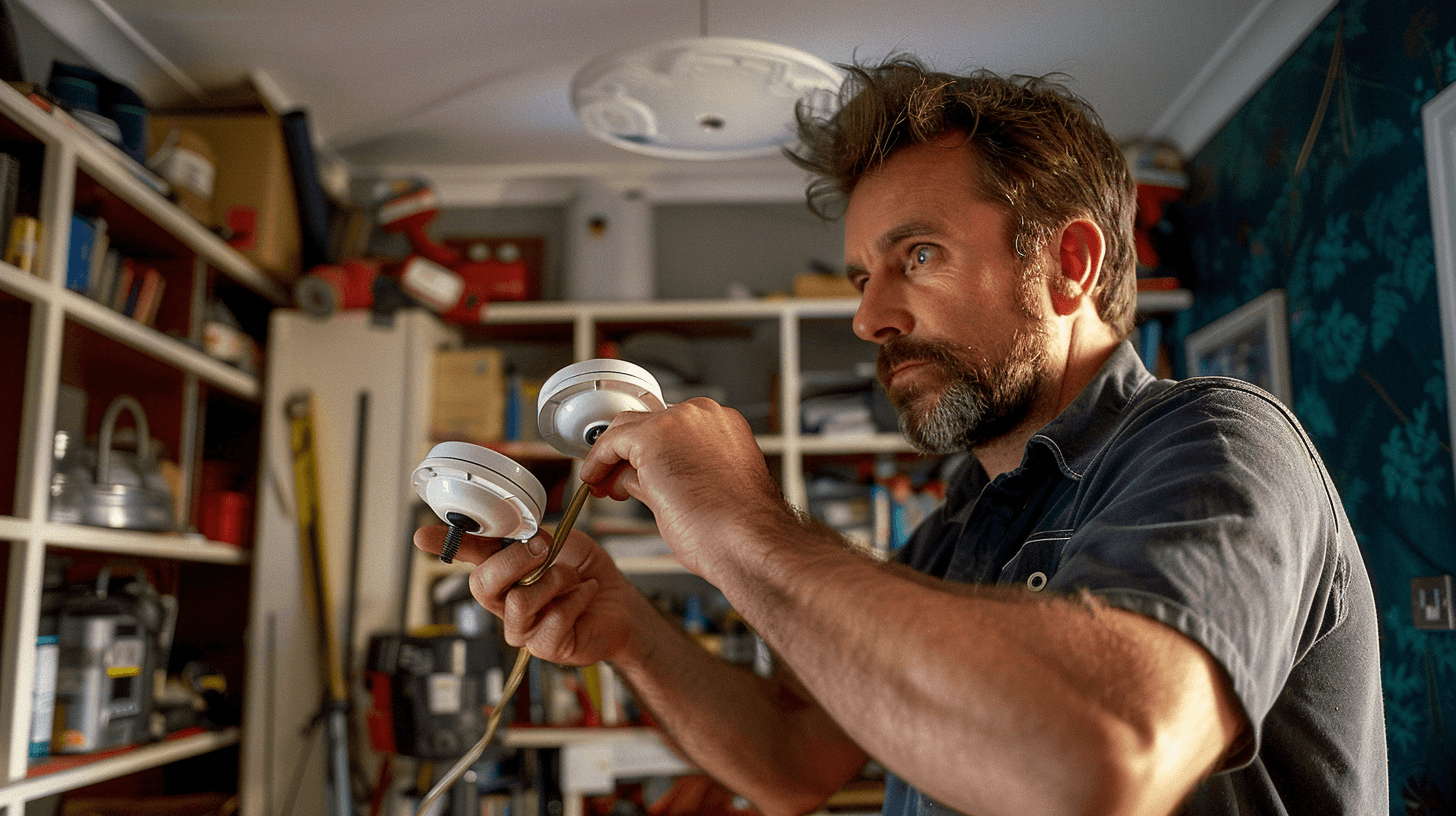
Long-Term Running Costs for Wired Smoke Alarms
Wired smoke alarms typically incur lower long-term running costs as they are connected to the property’s electrical system, eliminating the need for battery replacements. However, they may require occasional maintenance checks by a professional to ensure they remain in good working order, which could incur a service fee.
Battery Replacement in Wireless Smoke Alarms
Wireless smoke alarms require regular battery replacements, which can vary from annually to once every few years depending on the model. Property owners should factor in the cost of batteries and the time required for maintenance when considering a wireless system.
Critical Maintenance for Wireless Detectors
To ensure the functionality of wireless detectors, it is critical to perform regular maintenance checks. This includes testing the alarm function, checking for signal interference, and replacing batteries as needed.
Total Cost of Ownership Implications
The maintenance requirements for wireless smoke alarms can affect the total cost of ownership. While the initial investment may be lower, the ongoing need for battery replacements and potential signal boosters to combat interference can add up over time. Property owners should weigh these factors against the convenience of wireless system installation and flexibility.
System Flexibility and Future-Proofing Properties

Adapting to Changes with Wireless Smoke Alarms
Wireless smoke alarms offer superior adaptability to changes in building layout or usage. Their battery-powered nature and communication via radio signals allow for easy relocation or addition of units to suit the evolving needs of your property.
Limitations of Hardwired Systems
Hardwired smoke alarms, while reliable, present limitations in flexibility. Once installed, reconfiguring the system to accommodate structural changes or property expansions can be both challenging and costly, often requiring additional construction work and electrical modifications.
Influence of Flexibility on Property Modifications
The flexibility of a smoke alarm system is a critical factor when considering future property modifications. Wireless systems provide the ease of expanding or altering without significant infrastructural changes, thus facilitating smoother transitions during renovations or extensions.
Considerations for Future-Proofing Smoke Alarm Systems
To future-proof your smoke alarm system, consider the potential for property changes and technological advancements. Opting for a system that can integrate with smart home technologies and adapt to future safety standards will ensure long-term viability and compliance.
Technological Integration and Network Protocols

Bridging Systems with Wi-Fyre Technology
Wi-Fyre technology is designed to create a cohesive smoke alarm system by integrating hardwired and wireless devices. This allows property owners to leverage the reliability of wired alarms with the flexibility of wireless units, creating a comprehensive safety network.
Role of Wireless Surveys in System Optimization
Wireless surveys are essential in assessing the communication strength and identifying potential signal interferences within a property. They ensure that wireless smoke alarms are placed in optimal locations for uninterrupted performance.
Interaction of Field Devices in Integrated Networks
Field devices within an integrated smoke alarm network communicate with each other to provide real-time alerts and system status updates. This interconnectivity enhances the overall responsiveness and reliability of the smoke alarm system.
Integrating with Zigbee and Z-Wave Protocols
The integration with Zigbee and Z-Wave protocols allows smoke alarms to function within a larger smart home ecosystem. These protocols facilitate device compatibility and enable centralised control. However, they also introduce complexity in setup and require a thorough understanding of network protocols to maintain system integrity.
Product Selection and Manufacturer Support

When selecting smoke alarms, it is crucial to consider a range of product features and manufacturer support options to ensure system reliability and effectiveness.
Comprehensive Product Information
When choosing smoke alarms, you should evaluate the detector’s sensitivity levels, alarm volume, and connectivity features. For wired detectors, assess the durability and how they integrate with your property’s electrical system. Wireless options should be evaluated for battery life and ease of installation.
Enhancing System Reliability with Technical Support
Manufacturers like Eurofyre provide technical support that can significantly enhance the reliability of your smoke alarm system. Access to expert guidance for installation, troubleshooting, and maintenance ensures your system functions optimally.
Benefits of Manufacturer Partnerships
Partnerships with reputable manufacturers can offer you extended warranties, up-to-date information on product advancements, and potential discounts on bulk purchases. These partnerships also often include access to training resources that can help you understand and maintain your smoke alarm system more effectively.
Durability and Effectiveness of Wired Detectors
Wired detectors are typically more durable than their wireless counterparts due to their hardwired power source, which eliminates the risk of power failure due to battery depletion. They are also considered more effective in larger properties where wireless signal range may be an issue.
Prioritising Safety in Smoke Alarm Systems
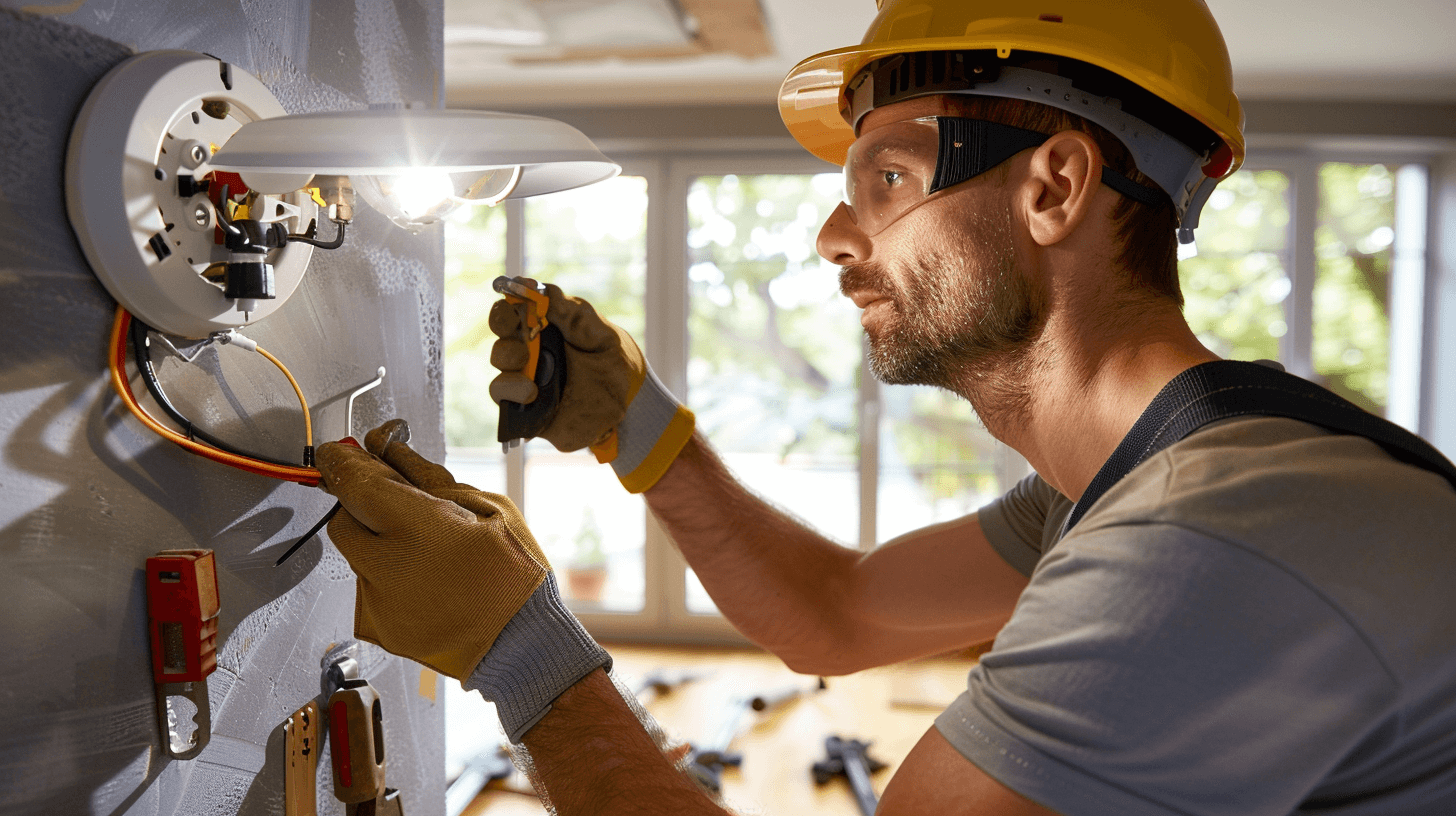
When selecting smoke alarms, safety should be the paramount concern. The choice between wired and wireless systems should not be dictated solely by cost but by which system provides the most reliable protection for your specific environment.
Usability Factors Affecting User Experience
The user experience for smoke alarms encompasses ease of installation, maintenance, and the clarity of alerts. Wireless systems offer ease of use through simple installation and the ability to interconnect with smart home devices for remote monitoring. Wired systems, while requiring a more complex setup, provide a consistent power source and are less likely to require battery changes, reducing maintenance efforts.
Impact of Safety Considerations on Decision-Making
Safety considerations should guide the decision-making process. This includes evaluating the reliability of the alarm system in various conditions, the longevity of the alarm’s sensors, and compliance with safety standards such as NFPA 72.
Role of User Experience in System Effectiveness
The effectiveness of a smoke alarm system is intrinsically linked to the user experience. Systems that are user-friendly encourage regular testing and maintenance, ensuring they remain operational when needed most. The integration of alarms into smart home systems can also enhance user engagement and provide additional safety features, such as remote notifications.
Professional Installation Services and Accreditation
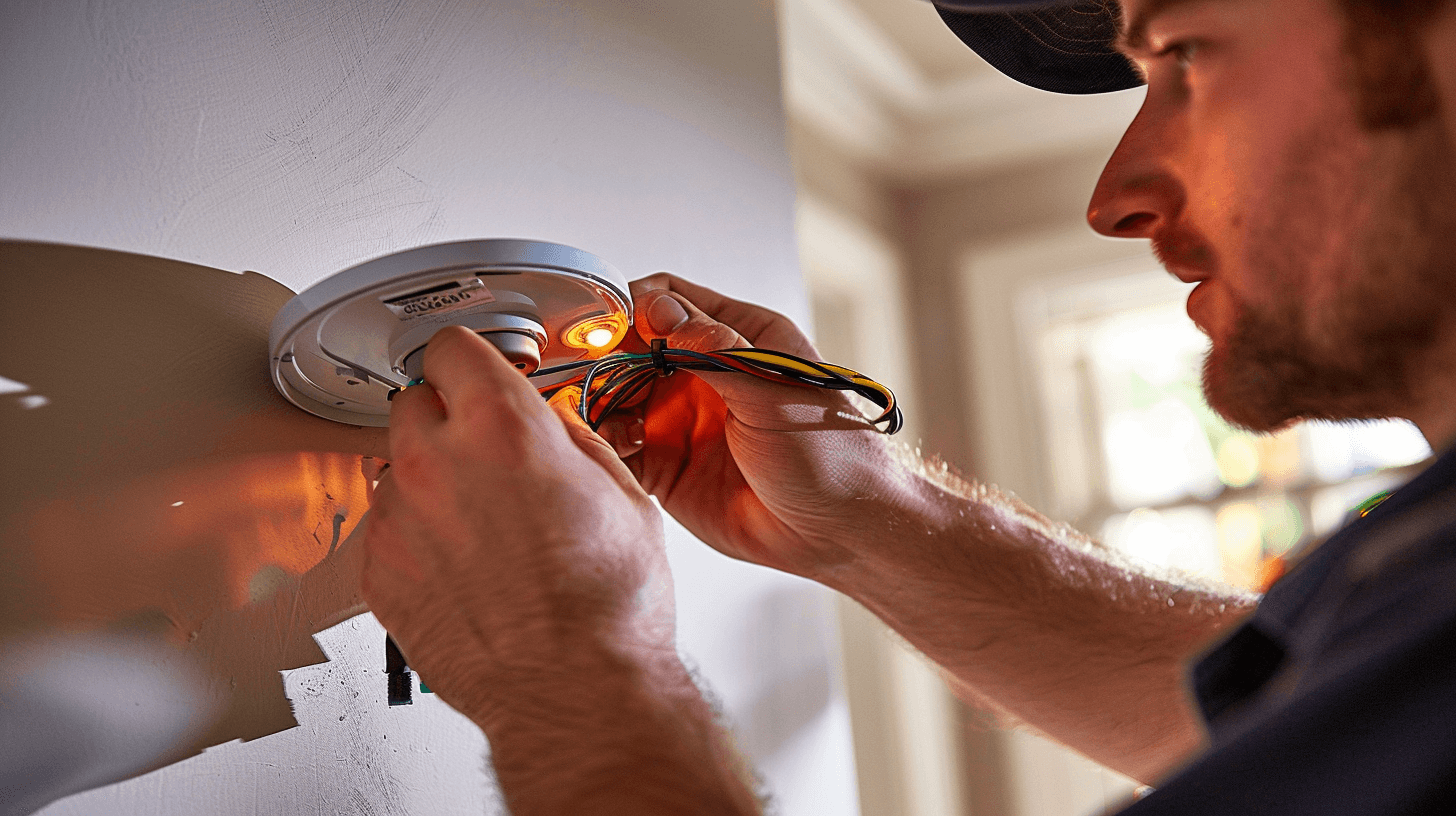
Necessity of Professional Installation for Wired Systems
Professional installation is recommended for wired smoke alarm systems due to the complexity of integrating with a property’s electrical circuitry. Accredited electricians ensure that the installation meets electrical safety standards, reducing the risk of malfunctions or fire hazards.
Accreditation Standards for Smoke Alarm Installation
Service providers installing smoke alarms should hold accreditations such as NICEIC, ISO 9001, or ISO 45001. These certifications indicate adherence to industry standards and a commitment to safety and quality workmanship.
Compliance with Safety Standards Through Professional Installation
Accredited professionals are versed in the latest safety regulations, including NFPA 72 and UL standards. Their expertise ensures that your smoke alarm system is compliant with legal requirements and operates effectively in emergency situations.
Advantages of Engaging Accredited Professionals
Utilising services from accredited companies like All Service 4U provides assurance of quality. These professionals bring experience, a thorough understanding of fire protection systems, and a guarantee that the installation will be conducted with precision and care.
Addressing Errors and Ensuring System Accuracy
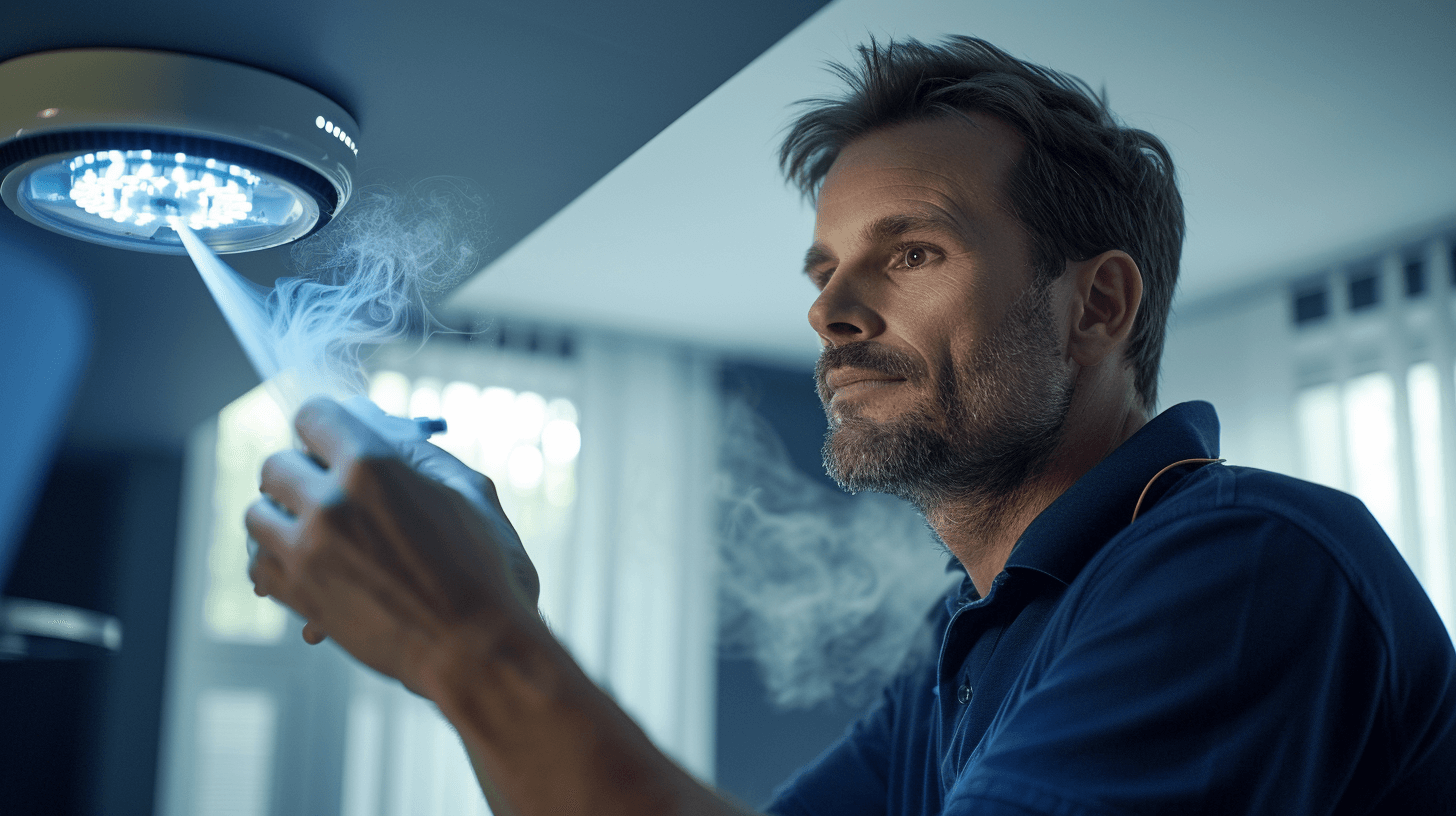
Troubleshooting Common Smoke Alarm System Errors
Property and business owners can address common smoke alarm system errors by regularly testing each unit and ensuring that all components are clean and free from dust. For wireless systems, checking for signal interference and ensuring that batteries are replaced before their expiration date is crucial.
Technical Issue Resolution
In the event of technical issues such as “page not found” errors in smart smoke alarm interfaces, resetting the system or updating the software can often resolve the problem. It is also advisable to consult the manufacturer’s technical support for assistance with persistent issues.
Importance of Accurate Emergency Contact Information
Accurate contact information is vital for emergency services to respond promptly in the event of an alarm. Owners should regularly verify that all contact details are current and that the alarm system is correctly programmed to alert the necessary services.
Minimising False Alarms with Precise System Configuration
Precise system configuration plays a pivotal role in minimising false alarms. This includes proper placement of smoke detectors away from potential sources of false triggers, such as cooking vapours or steam, and configuring sensitivity settings according to the environment. Regular maintenance and professional calibration can further reduce the likelihood of false alarms.
Compliance with Safety Regulations and Standards

Key Safety Regulations for Smoke Alarms
Smoke alarms are governed by stringent safety regulations to ensure they function effectively in the event of a fire. The National Fire Protection Association (NFPA) provides guidelines that dictate the placement, maintenance, and testing frequencies for smoke alarms. Adherence to these guidelines is not just a matter of best practice but a requirement for ensuring the safety of occupants in residential and commercial buildings.
NFPA Guidelines and System Choice
NFPA guidelines influence the choice between wired and wireless smoke alarms by setting forth standards for reliability and responsiveness. For instance, NFPA 72, the National Fire Alarm and Signalling Code, specifies the need for smoke alarms to be interconnected so that the activation of one alarm triggers all alarms within the systema feature more easily achieved with wired systems but also possible with certain wireless models.
Compliance Requirements for Insurance and Legal Purposes
For insurance and legal purposes, smoke alarm systems must meet local building codes and standards set by organisations such as Underwriters Laboratories (UL) and the Institute of Electrical and Electronics Engineers (IEEE). Compliance with these standards ensures that smoke alarms are reliable and effective, which can also lead to reduced insurance premiums.
Impact of IEEE and UL Standards on System Selection
Adherence to IEEE and UL standards impacts system selection by ensuring that smoke alarms meet rigorous safety and performance criteria. These standards cover everything from the alarm’s sound level to its resistance to environmental factors, guiding property owners toward systems that offer the highest level of protection.
Assistance in Choosing the Right Smoke Alarm System

All Service 4U provides expert guidance to help you select the smoke alarm system that best fits your property’s specific requirements. Their team evaluates factors such as property layout, electrical infrastructure, and integration with existing smart home systems to recommend the most suitable wired or wireless solution.
Round-the-Clock Installation and Maintenance Services
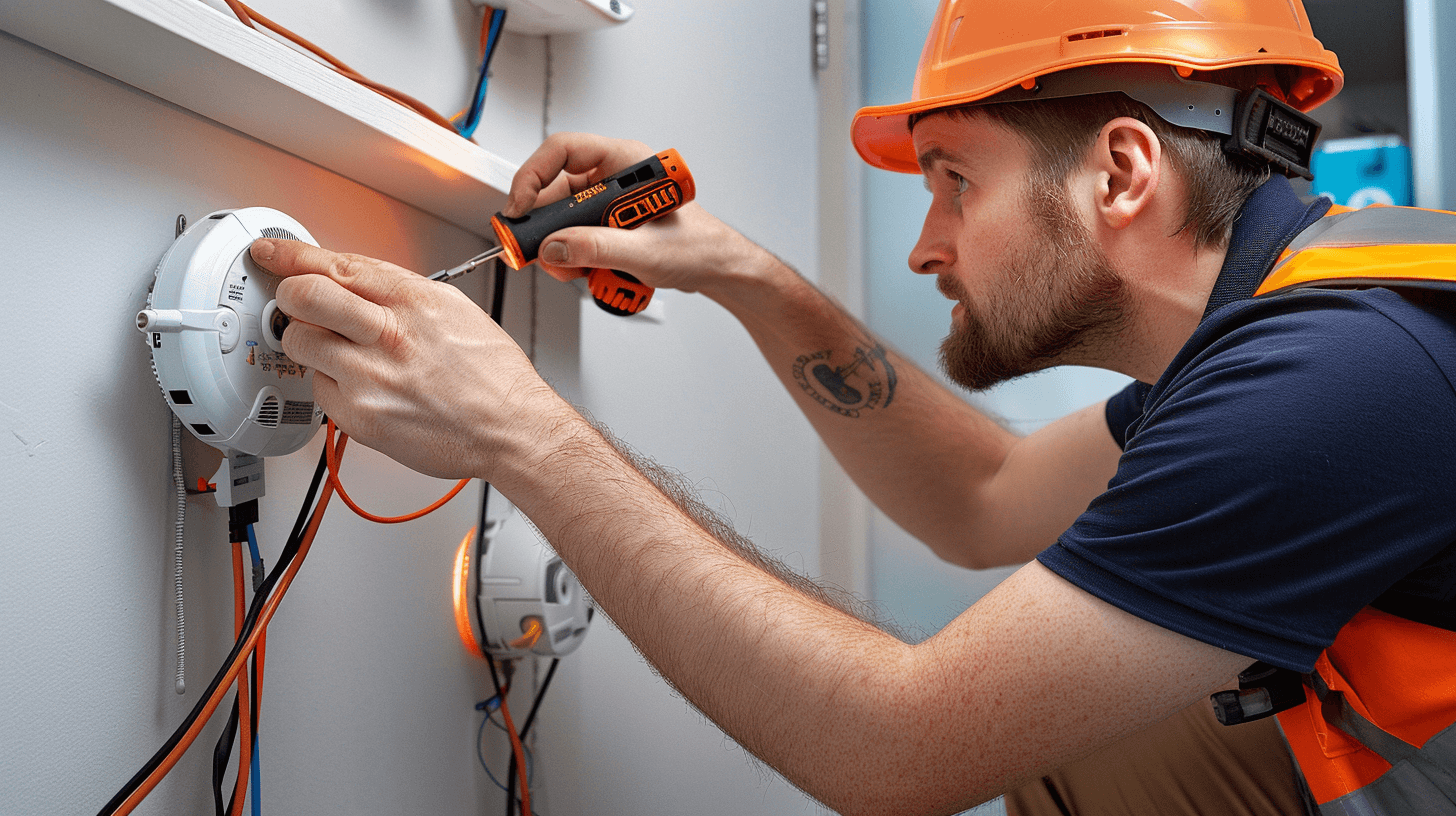
All Service 4U offers comprehensive 24/7 services for the installation and maintenance of smoke alarm systems. Whether it’s an emergency replacement, routine check-up, or system upgrade, their technicians are available to ensure your smoke alarms remain in optimal working condition.
Seamless Installation Experience
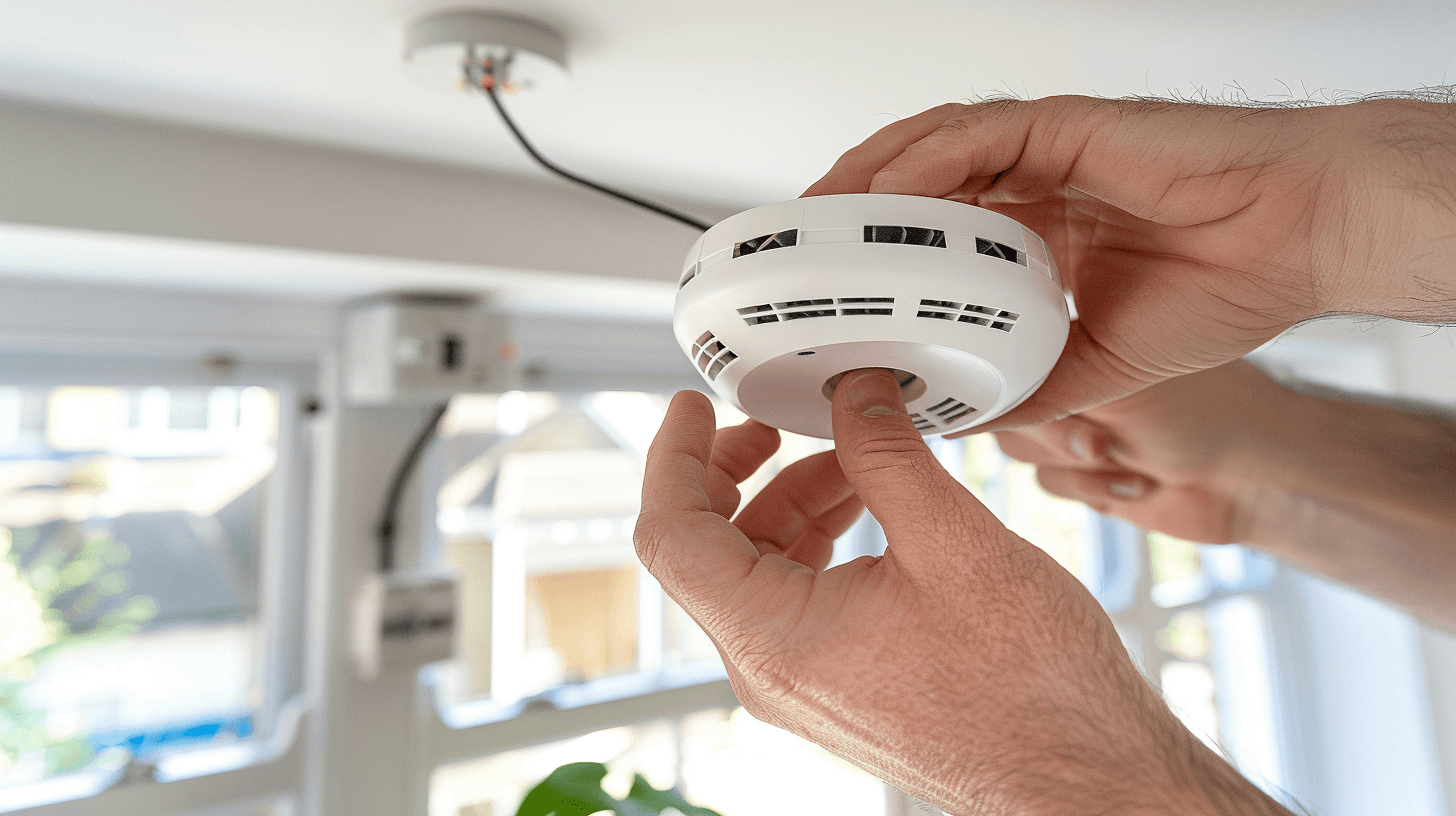
Contacting All Service 4U guarantees a seamless installation experience. Their accredited professionals are equipped with the latest tools and knowledge to instal your smoke alarm system efficiently, adhering to all safety standards and minimising disruption to your daily activities.
Why Opt for All Service 4U
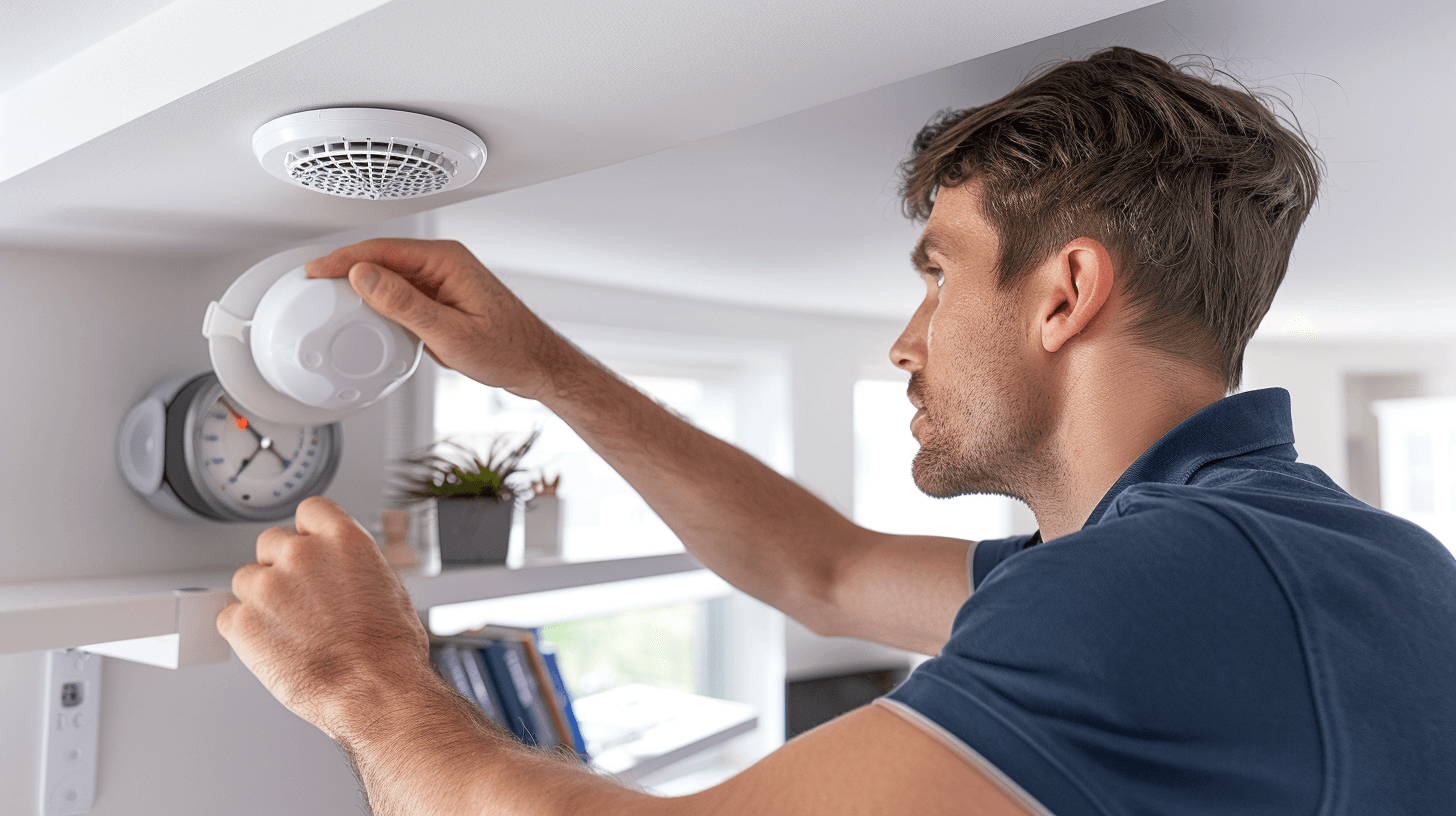
Choosing All Service 4U for your smoke alarm needs ensures that you receive service from a team with a strong track record of quality and reliability. Their accreditations and commitment to customer satisfaction make them a trusted provider for ensuring the safety and compliance of your property’s fire detection systems.

